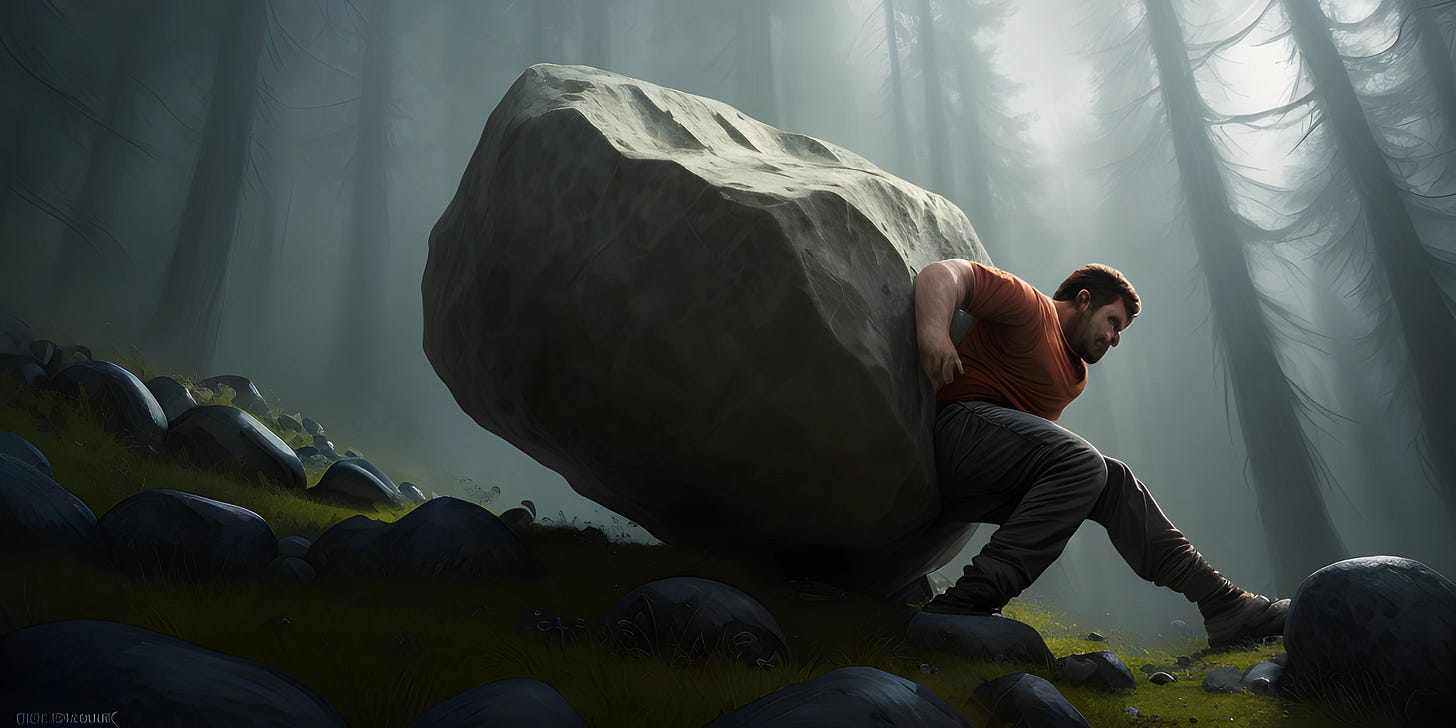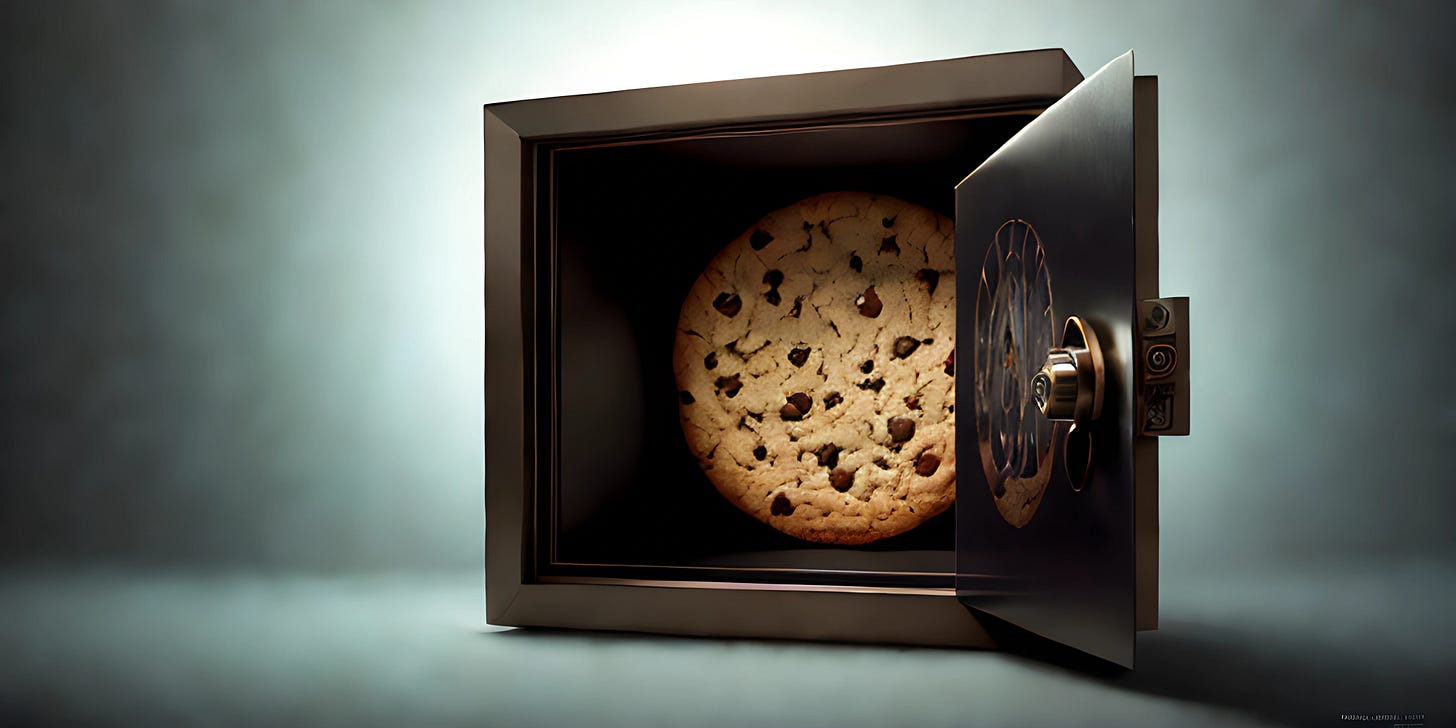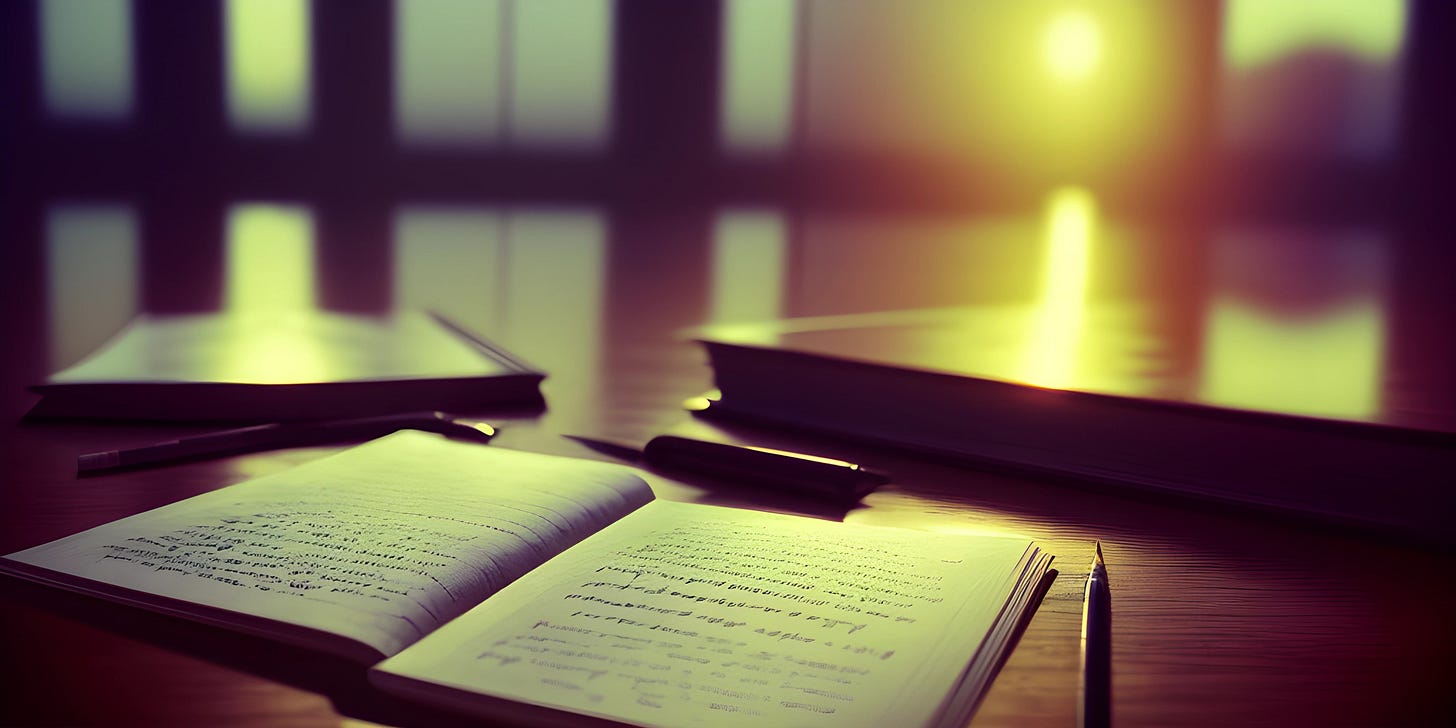The Discipline of Focus
Basic Tactics for Writers and Filmmakers to Finish Their Work Faster and More Effectively
A friend once confided in me about how hard it is to focus on their stories, which is something I often hear from creators. That’s not surprising given that A. Creating a story takes a considerable amount of time with a lot of moving parts and B. We live in a kind of post-modernist hyper-reality where we’re constantly bombarded by things that distract us from accomplishing our tasks. Then when you factor in a 40-hour work week along with weekend plans, it’s easy to find yourself lost and always racing against time.
This is something that I struggle with, as well, but over the years I’ve learned some techniques that have dramatically helped me focus better on my writing and film work. So perhaps some or all of these things will prove helpful along your journey. One of the greatest tragedies in the World is having too many people full of great ideas who never land them on page or screen. We thirst for novelty, and if you want to provide that through creative work, part of the equation is learning how to focus and stay on task. So here’s what I do.
Live Your Life Like a Monk By Eating Well, Exercising Regularly, and Getting Sleep!
I once saw an interview with Chuck Palahniuk, the iconic writer of Fight Club, claiming that he had to live his life like a monk to generate the best stories. No, he didn’t join a monastery in China nor did he sit around and meditate for hours. It was more of a hyperbolic expression of the kind of discipline you need to form in your own life if you want to maximize your creative juices.
And the first step is to make sure you regularly eat healthy food, exercise, and get enough sleep. Yes, I know, you heard this a million times, but I’m unconvinced that most people truly understand what the implications are for not doing these things, particularly younger people. If they did, then they’d be treating junk food like alcohol.
When I was growing up, my parents were too busy to make home-cooked meals, so my brothers and I always ate TV dinners, Hot Pockets, and a whole range of other junk food. Cut to age 24 and suddenly I found myself struggling to maintain my energy and concentration throughout the day. Hell, I could barely get out of bed.
By my late 20s, it felt like I was in this giant hazy bubble all the time. Life was confusing and exhausting to the point where it began to impact my ability to do any work, let alone, think. Worse, I was getting dull headaches, was always sick, and was often out of breath just taking small walks. I wasn’t even that big! Eventually, I decided to go to the doctor only to discover that my blood-sugar levels were through the roof, along with my blood pressure and sodium levels. On top of that, my vitamin levels were so low, they warned me that if I kept this lifestyle up I would be dead in ten years.
This was a huge wake-up call, so I immediately cut all the bad food out. Now I mostly eat a variety of lightly seasoned vegetables with non-salt spices, low-fat meat, nuts, bananas, and plain black coffee. I also decided to get the entire alphabet of vitamin supplements. Within a few days, I went from feeling like I was 80 to feeling like I was 18, again. Combined with a minimum of 7 hours of sleep and working out a couple of days a week, I now have the energy to work 16 hours instead of just a few. And I can still find the energy to hang out with friends over the weekend.
That is the kind of power you can gain just by doing these three simple things. Look, I get it. Life is one giant struggle, so it makes sense that we’re compelled to retreat to our vices in order to get that dopamine hit.
It’s totally fine and even necessary to blow some steam from time to time by doing unhealthy things like stuffing our faces with pizza or getting a few drinks with friends.
So I’m not suggesting that you never eat anything bad or beat yourself up when you skip a workout. I’m just suggesting that you view these unhealthy habits the same way you view alcohol. It’s fine in reasonable portions at the right times, but if you’re drinking every day…Well, you’re gonna have some major problems.
The same is true for bad food, lack of sleep, and exercise. If you don’t handle these basic things, you’ll have very similar health issues to what I had, and that will lead to DEATH! But well before reaching that point, you’ll feel constantly tired, unfocused, unmotivated, and depressed. So not only will it be significantly harder to make your stories, but it’ll also be harder to…
Learn How to Break and Form Habits
Learning how to do this is fundamental when it comes to boosting productivity. The key is to understand that when you perform a habit regularly, you’re conditioning your body to release dopamine every time you do it. It’s almost like your brain is rewarding you for doing the thing.
Now, sometimes this can be great but other times, not so much.
Say, for instance, you’re the kind of person who lounges on the couch all day and stuffs your face with junk food. Sure, you might feel guilty for not having done anything…But you still feel pretty good at the moment because you just ate all that delicious food and you’re super relaxed. By the same token, if you were working regularly and completing important tasks, you would also feel pretty good, only this time it’s because of the satisfaction you’re getting from accomplishing those tasks. In both instances, you’re feeling good in some sort of way…That’s dopamine.
The only real difference between these two scenarios is that one required much more work to get a similar level of satisfaction, which means it’s harder to form that habit…I know, it’s always the good ones that are hard to form! So how do you condition yourself to break the habits you don’t want while forming the ones that you do?
First, take small steps. Rome wasn’t built in a day, so don’t assume you have to start running marathons and starving yourself.
Create small benchmarks that are more easily attainable. Maybe you smoke 10 cigarettes a day. Instead of going cold turkey or reducing your consumption by half, smoke 9 cigarettes a day. Do that for a week then drop down to 8, and do that for a week. Reduce the amount once a week, and eventually you can go down to zero. The same is true for when you want to form positive habits, like writing. Commit to one paragraph per day, and after a week bump it up to two, and so on.
Second, you want to create friction between yourself and the bad habits in your life while removing more friction from the good ones.
For instance, you might love eating those late-night cookies in the pantry. Next time you go to the grocery store, get some raisins or bananas so that when it’s 12 P.M and you roll into the kitchen, those will be your only options unless you want to put on some pants, drive all the way out to a gas station, and pick up some cookies. That’s what I mean by creating and removing friction. You can apply this to any habit and dramatically improve your chances of overcoming it.
Third and final, become “Pavlov’s Dog” and reward yourself when you do something good or abstain from doing something bad.
Get through that scene in your screenplay and take a five-minute break to watch or read something, maybe even grab a piece of gum or coffee. Or let’s say you really want to crack open that beer on a Friday night but know you do that too much. Go out and get some sushi, or see a movie with your friends. If you repeat the reward over and over again, you’ll condition your body to expect it when you do or don’t do that habit, which will make it easier to form or break it.
It’s not the easiest thing to do, but it’s certainly doable and a lot like working out. At first, it sucks, but eventually, you acclimate to it, and over time you actually begin to crave it, believe it or not.
Start Using a Daily Agenda To Prioritize Your Tasks
This sounds like something only an important executive or some famous person should be doing, but I recommend setting up an agenda for the week if you find yourself bewildered by all the tasks you have to accomplish every day. Maybe you’re retired and your week doesn’t have much going on. If that’s the case, then feel free to ignore this. But if you’re relatively young, like me, it’s likely that your week is packed with all sorts of things, from personal errands to all those projects you need to complete.
So I spend every Sunday writing out a list of things I need to do for each day of the week that I’m heading into. This allows me to plan better and prioritize my time so that I can carve out moments for myself to focus on my stories. Otherwise, I get scatterbrained and forget to do things, which bleeds into the proceeding days. Then I end up racking up so many other tasks that aren’t even related to writing, I’m eventually forced to put everything off just to get those simple little things done.
That’s why daily agendas were a huge game-changer for me because they mitigated this issue. So I highly recommend it. Granted, you don’t have to be as comprehensive as the President who has a minute-by-minute agenda. But just forming a simple list of tasks that should be done for the day can really make a difference in time. Every phone has a calendar. Utilize that app! Or use a pen and paper. Whatever works for you.
Carve Out Time to Develop and Form a Ritual for Creating
This falls in line with forming good habits through repetition. If you create a subtle ritual for yourself every time you start to write, you’ll condition your mind to get into “Writing Mode” as soon as you start, which will allow you to jump right into the work. Ever find yourself beating around the bush when you finally sit down and commit to writing? This is how you reduce that problem.
For example, my writing ritual is to brew some coffee and sit in the same exact spot in my living room with ambient lighting and super chill soundscapes blasting through my speakers. I do this every single time, and now whenever I smell coffee or hear ambient soundscapes, my brain automatically goes into “Writing Mode”. I’m practically compelled to start writing something down, no matter where I am.
It’s the same concept as always waking up to that annoying alarm sound. If you hear it during the day, such as in a movie, your body kind of jolts because you’re so used to being abruptly awakened by that sound. You’ve basically conditioned your brain to fire off these signals every time you hear that noise.
So if you form these kinds of “rituals” as you’re writing, it’ll be much easier to dive into the task immediately because the sounds, lights, tastes, and smells condition your brain to get into that headspace automatically. Of course, I’m not telling anyone to do my ritual. Everyone should form their own unique one that suits them. Just find the things that calm you down and put your mind at rest because if you’re thinking about a million different things, you’ll never get anything done!
Use The Internet as a Tool Not as a Means to Escape
Most of us escape online, particularly on social media. We can’t deny this, and it’s fine to do so in small portions. But don’t get lost in it because they’re designed to make you addicted to their services, and if you let it, it will take over your life. That’s why I like to treat the Internet as more of a tool rather than a means to escape, and I only escape into it when the time is appropriate, such as when I’m taking long trips or sitting on the toilet.
But for the most part, I try to limit my time on these platforms and use the Internet for things like writing or researching. When I do take breaks, I’ll watch a little bit of a show or movie, or I’ll read a book because those are much easier to put down than the forever scrolls of social media content. It’s like the difference between a hamburger and heroin. Both may feel good, but obviously, one is MUCH harder to put down.
So seriously, do yourself a favor and limit your social media consumption because it will dramatically improve your concentration, productivity, and overall mental health since, oftentimes, we end up in heated fights that can be distracting. Hell, I’m sure half of the time we’re probably arguing with bots. None of these activities will improve your life.
But worse, if you live on social media, you’ll lose nuance in your train of thinking and how you view the World, which is a death sentence for any writer.
That’s because ideas are filtered through algorithms and fed off each other to the point of being echoed and repeated by millions, which has resulted in fractionalized hive-mind belief systems.
Defend your mind by reducing your consumption of social media content and replacing it with interesting nonfictional literature from as many disciplines as you can. This is not only healthier for your mind, but as a writer, it can really help you set yourself apart from the pack, and that’s a huge part of captivating an audience. If you convey what everyone else is conveying about the World…Well, it just won’t be as interesting as providing them with a more unique perspective they might not have had any exposure to.
And you can’t do that if you’re always scrolling through social media. So yeah…Limit your time, if you can, or don’t, and make the “Mountain” higher to climb.
Balance Work With Leisure
Blind ambition will lead to ruin. This was true for Macbeth, Tony Montana, Walter White, and so many other fictional characters. The same will apply to you if you’re always letting your desire to be a successful storyteller override your desire to have fun. You have to balance this out because the road to success is insanely long!
I had to write obsessively every day for 2-6 hours at a time for seven years just to be decent at it, and for a good chunk of that time, I spent it in isolation. I didn’t balance it out enough with leisure. I remember one time I spent 3 or 4 months, straight, going to my day job and then back home where I’d write all night. My contact with friends and family was severely limited because I was so driven to write a masterpiece; I put my entire social life to the side. Eventually, I felt like I was going crazy and just had to stop, especially since my writing had suffered as it had grown dull and less emotional.
So I decided to go do something normal like grab dinner with friends. But when I did this, it felt super awkward because I had forgotten how to socialize! I kept accidentally interrupting people and made slightly weird expressions when I got lost in thought as I often do when I’m alone. Then there was the awkward goodbye hand-shake/hug that I don’t even want to get into.
The point is, don’t do what I did. It’s good to be ambitious and have a solid work ethic, but you have to understand that this isn’t a race. It’s a marathon, and if you isolate yourself too much from the outside world in pursuit of that dream, not only will your mental health suffer, but your writing will also take a dramatic hit.
We’re social creatures whether we want to admit it or not. And yeah, it’s harder to dress up and drive 20 minutes away to hang out with people than to sit on the couch and watch your favorite movie. But it has to be done, otherwise, you’ll lose your sense of self, which will reduce your chances of success as a writer.
That’s why, as busy as I am, I try to carve out two days a week to be social and have fun. And I try to be open to new things because that can really help with creativity. The best people to do new things with are other writers and filmmakers. To me, they’re the coolest group of people in the World because they’re just a bunch of odd-ball misfits with so many interesting perspectives that can help you with your own storytelling. And yes…they also like to party.
So write as often as you can, but always remember to balance it out by being with the people you care about. Never take the presence of another person for granted because trust me when I say that it’s very easy to lose them. That’s why I think of isolation like the movie, Inception. Don’t get lost in too many dreams, or you’ll never come back!
Conclusion
You can certainly go down the rabbit hole and find all sorts of tricks to boost your productivity, but most of those are overkill and not really necessary. As James H. Clark, one of the founders of Netscape, once said, “The main thing is that the main thing is the main thing.”
As a storyteller, your main “thing” isn’t to fully optimize your life like an Andrew Huberman fanatic. Your main thing is to create the stories you love and make money off of them. This means that everything you do in life should serve this goal, and that includes living a strong, healthy life by forming the right habits while limiting the bad ones, managing your time, and living an enjoyable life with friends and loved ones.
So next time you find yourself struggling in these areas, just remember that if you don’t overcome these basic things in your life, you’ll have a much harder time achieving success. Whether you decide to manage a retail store or go to the Moon, every accomplishment will be hard to attain in its own way. There’s never an easy solution to success, but hey…At least there is one!
Hope this was helpful and as always, best of luck in your creative endeavors!
Story Prism
___________________________________

















usable